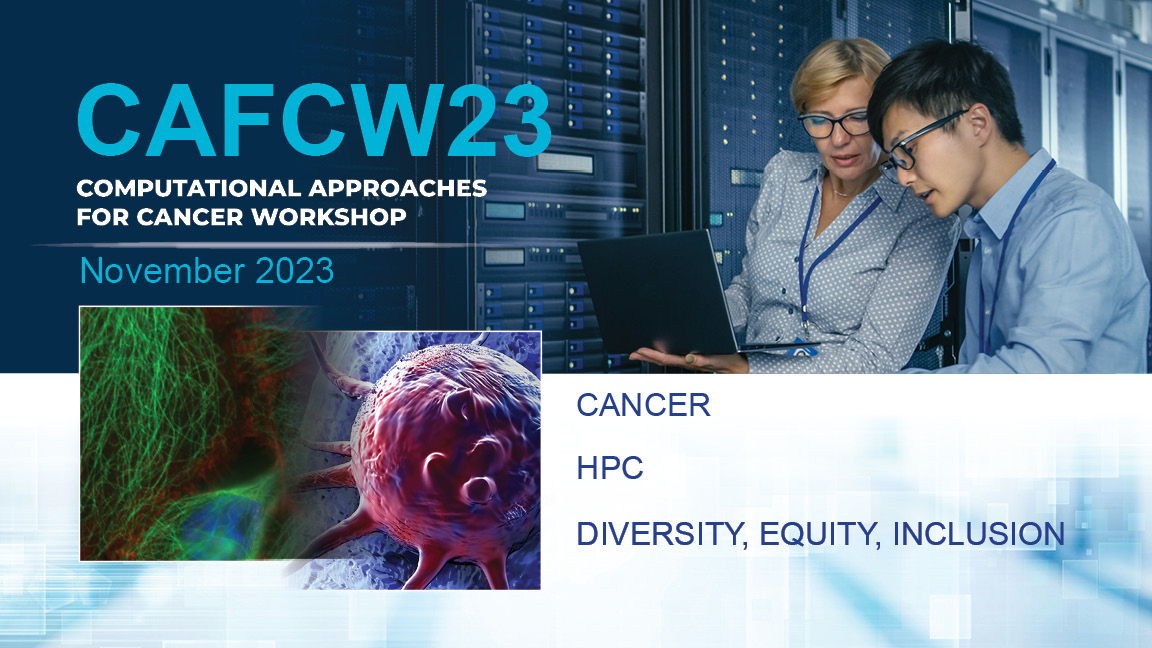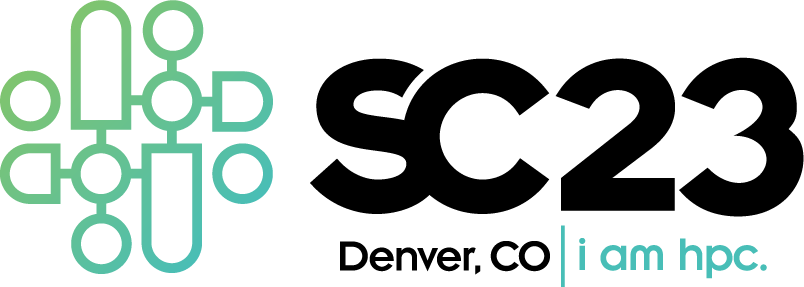Ninth Computational Approaches for Cancer Workshop (CAFCW23)
Held in conjunction with SC23:
The International Conference on High Performance Computing, Networking, Storage and Analysis
Location and Timing
Denver, Colorado, USA
November 12, 2023, 1:30pm - 5pm MST
Key events and dates
|
Key Events |
Dates |
EXTENDED DEADLINE for Abstract Submissions |
August 14, 2023 |
|
Notification of Acceptance |
September 9, 2023 |
|
Early Bird Registration Ends |
October 13, 2023 |
|
Workshop |
November 12, 2023 |
CAFCW23 Special Session Topics
The CAFCW workshop for SC23 will be organized into four primary sessions to highlight different areas of common need and interest.
- Session 1 will emphasize computational and HPC approaches supporting cancer research and clinical applications. A featured presenter will provide context and perspective to research challenges and opportunities. Time will be included in the program for networking among attendees and presenters (assuming on-site) with specific activities designed to coalesce common interests.
- Session 2 focuses on interactive discussion, sharing perspectives on future opportunities and challenges, lessons learned, and efforts to broaden the diversity and inclusivity of the computational cancer workforce.
- Session 3 will focus on the special topic for the workshop which explores efforts to address diversity, equity, and inclusivity of essential data for cancer research and clinical care. Such efforts span many areas in cancer including clinical trials, digital twins, adaptive treatments, precision radiation oncology, and, of course, the use of AI to deliver precision cancer treatments.
- Sessions 4 will serve as the capstone for the workshop, with forward looking perspectives for HPC in cancer research and care enabling new frontiers and approaches. We also aim for the fourth session to include the cancer patient perspective, providing an important reality check and motivation to the entire community. Through efforts in using HPC to advance cancer research and care, the workshop reflects the theme of SC23, “HPC is me.”
As a unifying theme in 2023, the special topic of “Diversity, Equity and Inclusion – from Science to Scientist” will bring attention to not only limitations in the science due to unbalanced data, but also the inherent limitations in the workforce if all backgrounds, perspectives, demographics, and approaches are not involved. In an era where HPC is enabling digital twin approaches for complex diseases like cancer, such an emphasis is so very necessary for success across all populations.
CAFCW23 General Topic Call: Computational Approaches for Cancer
The CAFCW23 is highly relevant to SC given the pervasive interest in cancer applications of high performance computing among conference attendees. The workshop further sustains a special topics track to attract new attendees to the conference, as the role of computation in cancer raises in visibility as well as obtainability.
The topic of cancer is, unfortunately, a topic that touches everyone, attracting participation across all demographic, geographic, professional and organizational classifications. The workshop continues a well-established record of inclusivity by maintaining diverse organizing and programming committees, maintaining substantial cross-interest representation on panels within the workshop and actively engaging participants from all backgrounds. The workshop specifically takes efforts to include international participation to foster international collaborations as well as takes steps to assure gender balance on invited panels and as presenters.
To encourage broad participation, the workshop maintains an open call for submissions of papers focused on application of computational approaches to cancer challenges for consideration to present at the workshop. Lists of potential topics are provided below, including both potential HPC technologies used in cancer applications and cancer applications that may use HPC technologies. With a rapidly evolving field, authors are also encouraged to identify areas not listed.
Listed below are topic areas for the workshop (potential topics are certainly not limited to this list)
|
Cancer Research and Clinical Applications
|
Computational Approaches
|
Submission Guidelines:
Authors are invited to submit abstracts in English for consideration by the program committee. Abstracts will be considered for 15-minute presentations, submitted in English with a length up to 500 words.
Submissions not conforming to these guidelines may be returned without consideration or review.
Abstracts will be reviewed and judged on originality, technical strength, integration of computational approaches and cancer research topics, general alignment to expressed cross-disciplinary aims of the workshop and anticipated interest to workshop attendees. Abstracts will also be considered for specific alignment to the special workshop topic of Diversity, Equity and Inclusion – from Science to Scientist.
Submissions received after the due date, exceeding the prescribed length or not appropriately structured may also be returned without consideration or review.
In submitting the abstract, the authors acknowledge that at least one author of an accepted submission must register for and attend the workshop.
Abstracts should be submitted electronically as PDF documents at:
https://submissions.supercomputing.org/?page=Submit&id=SC23WorkshopCAFCW23Submission&site=sc23
Student Track
Beginning in 2020, CAFCW expanded its reach by adding a focus on workforce development. Again this year, we will be honoring students who may not traditionally attend the workshop (such as undergraduates and students from non-technical degrees) who submit accepted research. They will have a highlighted presentation, opportunities to engage with the Students@SC program, special programing focused on training and workforce development, and further awards to be announced. Students can submit their abstracts at Student Submission Form.
CAFCW23 Organizing Committee:
Eric Stahlberg, PhD, Frederick National Laboratory for Cancer Research
Sean Hanlon, PhD, National Cancer InstituteSally Ellingson, PhD, University of Kentucky
Patricia Kovatch, Icahn School of Medicine, Mount Sinai
Lynn Borkon, Frederick National Laboratory for Cancer Research
Morgan Granetz, Frederick National Laboratory for Cancer Research
Questions? Contact cafcw@nih.gov


